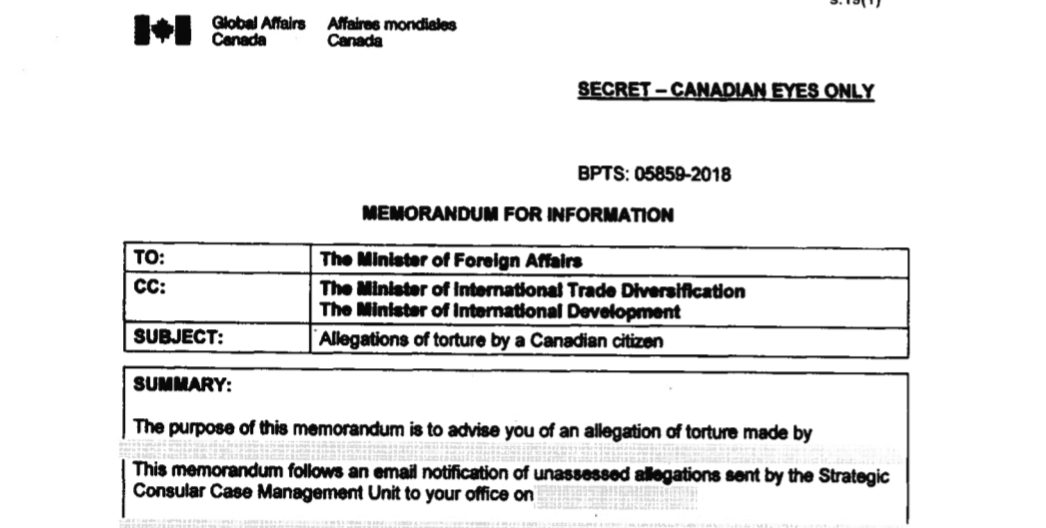One memo to Canada’s foreign affairs minister described the “infliction of pain” as a means of intimidation.

Another concerned a Canadian who, likely due to fear of retaliation, would not let the government raise his torture complaint with the prison director.
A third noted the greater risk for those “detained by national security agencies that operate with police powers outside the normal criminal law framework.”
The cases are among almost two dozen involving Canadians detained in 14 countries who have made credible allegations of torture to the federal government since 2014.
Declassified documents released under the Access to Information Act do not name the Canadians, nor disclose where they are being held.
But they provide disturbing hints of abuses.
Six cases of torture and mistreatment were brought to the attention of Canada’s foreign affairs minister last year alone, and the same number were reported in 2018, a federal official said.
“I wouldn’t have thought it would be that high,” said Gary Caroline, a Vancouver lawyer who has represented Canadians detained overseas.
Torture and mistreatment can range from extreme physical abuse to preventing access to a doctor, he said.
“It’s not always pulling out fingernails and applying electrodes to the victim’s body,” said Caroline.
“It can be as routine as denying medical treatment, denying proper food, the conditions in which people are kept can have a tremendous physical or psychological effect on the body.”
The numbers obtained by Global News highlight the need for “urgent, concrete action” by the government, said Amnesty International Canada secretary-general Alex Neve.
“It also underscores that the human rights scourge of torture continues to be a grim and harrowing reality in our world and that all governments, including Canada, must redouble efforts to prevent its occurrence and ensure redress to survivors.”
Canadians have complained about being subjected to torture and mistreatment in such countries as Iran, Syria, China, Sri Lanka and Saudi Arabia.
Global News has obtained copies of letters a Canadian imprisoned in Egypt sent to a Toronto church leader, lamenting Ottawa’s lack of response to his complaints.
Joseph Attar has been held for over a decade on allegations he was an Israeli spy.
In his letters to Rev. Majid El Shafie, he expressed his disappointment at the “silence of the Canadian government on my torture.”
He wrote that it was disheartening to see the Canadian government carry on normal relations with Egypt while he remained imprisoned on what he called fabricated charges.
In another letter, he wrote that crowding at his prison was “horrendous,” saying he was kept in a room measuring four by six metres with 31 other inmates and a single toilet.
“I saw one of the officers stepping on a prisoner’s neck with his shoe in front of me. This is in addition to making prisoners take off their clothes completely in extreme cold or hot weather to stand in front of the officers in a long endless line,” he wrote.
During a consular visit, a prison official commented that if Attar complained about his treatment, he would find witnesses to manufacture complaints against Attar, said the letter.
“I am afraid a case could be fabricated against me to stay in prison and never get out of it,” he wrote.
He said he had asked Canadian authorities to have him moved to a prison for foreigners “but I have not received any response until now.
His most recent letter was dated last November. He said it was “a cry out loud from the prison.”
“All I wanna do my brother is to get back home soon and forget about this drama, forget all about it, and live my life once again,” he wrote.
Justice Dennis O’Connor’s 2004 report into the case of Maher Arar called for improved training for consular officials so they could better identify signs of torture and quickly inform the minister responsible.
But the Auditor General reported in April 2018 that foreign affairs staff still received “only general training” and were taking too long to assess and pass on torture claims.
“In one case, we found it took 7 months before the department informed the minister,” the report read.
In response, the government began referring torture complaints to an Ad Hoc Working Group chaired by the Director General of Consular Operations.
“Its mandate is to review allegations of torture and mistreatment of Canadians abroad as they occur and to assess whether they are credible and serious,” says a report obtained by Global News.
The minister is informed in a memo.
“Following recommendations made by the Auditor General on the provision of consular services, Global Affairs Canada has implemented a process for responding to allegations of mistreatment and torture,” said the minister’s spokesperson, Adam Austen.
The department has also improved training for consular officers on dealing with arrest and detention cases, Austen said. Documents show that some cases are referred to the RCMP.
Roy Samathanam, a Canadian tortured in a Sri Lankan prison, said the government should openly identify countries that tortured Canadians.
He said even after the United Nations Human Rights Committee ordered Sri Lanka to compensate him for the abuses he suffered, federal officials took little action.
Caroline, the lawyer, said Canada was often over-cautious when dealing with foreign countries where its citizens are falsely imprisoned or being mistreated.
Victims are fearful of reporting allegations of torture to Canadian consular officials as consular visits are regularly monitored, according to Caroline, which means that many claims of torture go unreported.
However, when dealing with foreign governments that regularly use torture or have a proven track record of human rights violations, Caroline said the Canadian government should be more forceful and shine a spotlight on those cases.





Comments